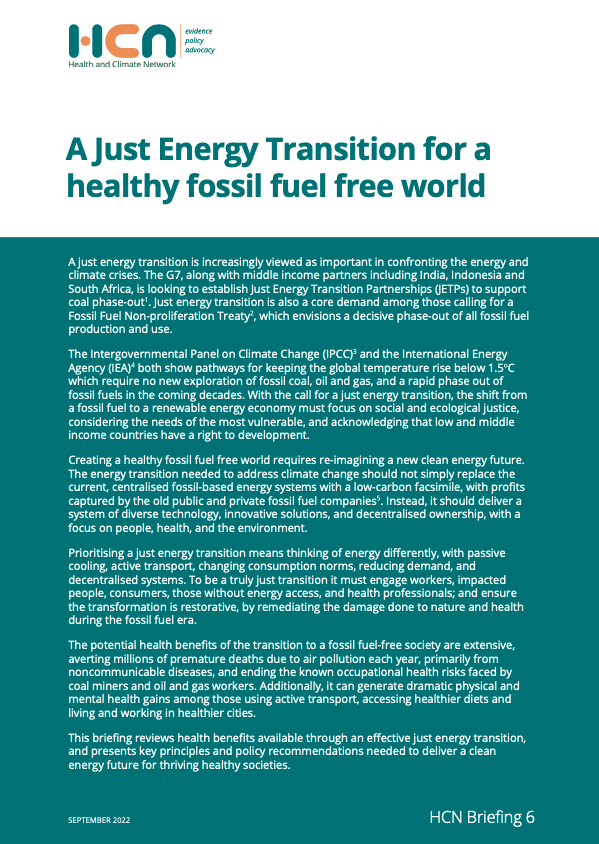Global, 10 October, 2022:- Governments can achieve a clean energy future for thriving healthy societies by effectively implementing a just energy transition, according to a briefing published today.
A Just Energy Transition for a Healthy Fossil Fuel Free World, published by the Health and Climate Network (HCN), outlines the health benefits of properly implementing just energy transition, and presents key principles and the policy recommendations needed to deliver a clean energy future for thriving healthy societies.
A just energy transition is increasingly viewed as important in confronting the energy and climate crises. The G7, along with middle income partners including India, Indonesia and South Africa, is looking to establish Just Energy Transition Partnerships (JETPs) to support coal phase-out. Just energy transition is also a core demand among those calling for a Fossil Fuel Non-proliferation Treaty, which envisions a decisive phase-out of all fossil fuel production and use.
The briefing states that “The Intergovernmental Panel on Climate Change (IPCC) and the International Energy Agency (IEA) both show pathways for keeping the global temperature rise below 1.5oC which require no new exploration of fossil coal, oil and gas, and a rapid phase out of fossil fuels in the coming decades. With the call for a just energy transition, the shift from a fossil fuel to a renewable energy economy must focus on social and ecological justice, considering the needs of the most vulnerable, and acknowledging that low and middle income countries have a right to development.”
“Creating a healthy fossil fuel free world requires re-imagining a new clean energy future”, said Alison Doig, Director of the Health and Climate Network. “Around the world governments must implement the energy transition needed to address climate change to not simply replace the current, centralised fossil-based energy systems with a low-carbon facsimile, with profits captured by the old public and private fossil fuel companies, but instead deliver a system of diverse technology, innovative solutions, and decentralised ownership, with a focus on people, health, and the environment”.
“Prioritising a just energy transition means thinking of energy differently, with passive cooling, active transport, changing consumption norms, reducing demand, and decentralised systems”, said Doig.“To be a truly just transition it must engage workers, impacted people, consumers, those without energy access, and health professionals; and ensure the transformation is restorative, by remediating the damage done to nature and health during the fossil fuel era.”
“The potential health benefits of the transition to a fossil fuel-free society are extensive, averting millions of premature deaths due to air pollution each year, primarily from noncommunicable diseases, and ending the known occupational health risks faced by coal miners and oil and gas workers”, she said. “It can also generate dramatic physical and mental health gains among those using active transport, accessing healthier diets and living and working in healthier cities”.
Policy recommendations detailed and expanded upon in the briefing include:
- Get the finances right for a healthy just energy transition
- Joined-up planning at ministerial level for development, health, and climate
- Mandated monitoring of health impacts with an equity lens
- Urban planning within planetary boundaries and for shared benefit
- Prioritise clean, healthy cooking solutions
A Just Energy Transition for a Healthy Fossil Fuel Free World can be downloaded from:
https://healthandclimatenetwork.org/a-just-energy-transition-for-a-healthy-fossil-fuel-free-world/
ENDS
Contacts: Dave Walsh, Communications Advisor, [email protected]
About the Health and Climate Network
The HCN community is a wide range of experts from a variety of sectors working across the climate change and health agenda. Members of our community bring experience and outreach across our core themes of clean healthy energy, active transport, thriving healthy cities, sustainable food systems and healthy diets, and resilient, low-carbon health care systems.
https://healthandclimatenetwork.org/


